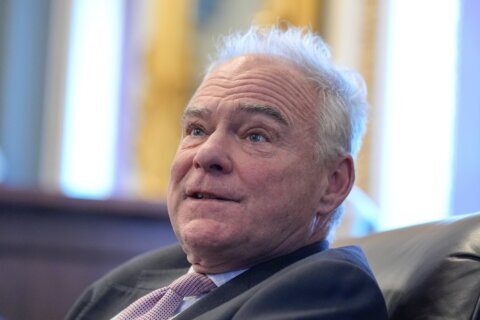The $1.2 trillion infrastructure bill passed by the U.S. Senate on Tuesday includes billions of dollars that could lead to long-term improvements for commuters in Virginia, Maryland and D.C.
Senators from Maryland and Virginia are praising the legislation, and say it will help the D.C. area address a host of transportation challenges and road projects.
Virginia is expected to receive $7 billion for federal highways in the state, along with $537 million to repair and replace crumbling bridges.
Sen. Mark Warner, who had a key role in the negotiations that eventually led to Senate approval of the bill, said there were a lot of “twists and turns” over the past few months.
“There were many days, where I would say ‘We’re this close, we’re this close,’ and I wasn’t sure we were going to be able to hang together,” the Virginia Democrat said in an interview with WTOP.
But in the end, Democratic and Republican negotiators were able to persuade their colleagues to support the legislation and celebrate a brief moment of bipartisanship.
“I think it is going to have a meaningful effect on our economy; I think it’s going to have a meaningful effect on people’s lives in Virginia and the capital region,” Warner said.
Metro will receive an annual $150 million over the next eight years. The transit agency has been struggling financially with a loss of customers during the pandemic and is still trying to address a wide range of safety issues, as well as needed capital improvements.
Warner noted the money will be important, especially as service expands in Virginia. A new Metro station at Potomac Yard is scheduled to open late next year.
Virginia Railway Express is also expected to get money, for work on the Manassas Line. The legislation could also lead to the widening of U.S. Route 1 in Fairfax and Prince William counties.
“There is no such thing as a Democratic or Republican pothole; they hit all cars equally,” Warner said.
As for Maryland, the state will receive $4.1 billion for its federal highways and $309 million for bridge replacement and repairs over a five-year period.
“One of the running jokes in Washington was this was Infrastructure Week and every week was Infrastructure Week, but it never happened,” Sen. Chris Van Hollen said. “Now it’s happened.”
The Maryland Democrat said that overall, the bill could mean a total of $16 billion for the state, when everything is added up for improvements and projects related to roads, bridges, transit, rail, water systems and broadband.
“So that’s a major investment in modernizing our infrastructure,” he said.
Both lawmakers, in interviews with WTOP, acknowledged there will be plenty of challenges ahead, as Senate Democrats move forward on a $3.5 trillion budget resolution, which is opposed by Republicans.
House Speaker Nancy Pelosi has said the House won’t take up the bipartisan infrastructure bill until the larger, so-called “human infrastructure” plan is passed by the Senate.
After this week’s vote-a-rama of amendments on the budget resolution, Senate committees will need to turn the package into legislation for votes this fall.
For now, Warner said, it’s a good feeling to know that a major bipartisan bill passed, especially after skeptics raised doubts for months.
“I talked to President Biden today and he is very, very pleased,” Warner said. “I know there will be more twists and turns in the House. But the one thing I can say, with I think 100 percent confidence: One way or the other, this bill will be signed by President Biden this year.”








